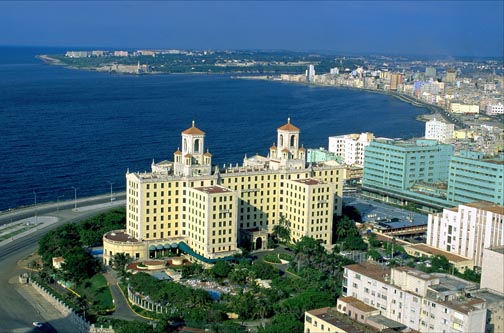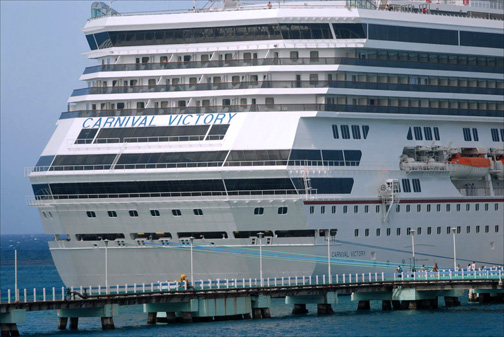Report urges Cuba to join int’l financial institutions


Paintings are spread out for sale at an outdoor flea market along Havana’s oceanfront Malecón. (Credit: Larry Luxner)
WASHINGTON — Now that the United States and Cuba have restored diplomatic ties after a 54-year hiatus, a new report suggests that Havana’s next step should be pursuing membership in the World Bank, the IMF and other international financial institutions (IFIs) such as the Inter-American Development Bank.
The study, “Cuba’s Economic Integration,” was co-authored by prominent Cuban economist Pavel Vidal and Scott Brown of the International Monetary Fund. Its July 14 release by the Atlantic Council’s Adrienne Arsht Latin America Center coincided with a lengthy discussion on the same topic.
Vidal addressed the panel briefly via a videoconferencing link from Colombia, where he teaches at Pontificia Universidad Javeriana in Cali. In addition to Vidal and Brown, participants included former U.S. Commerce Secretary Carlos Gutiérrez; Rafael Romeu, president and CEO of Miami-based DevTech Systems Inc., and José Ignacio López Perea, head of global commercial banking at leading Spanish bank BBVA.
Interestingly, Cuba is one of only eight countries that do not belong to the IMF. The 24-page report argues that Albania — which joined the IMF in October 1991 after ridding itself of one of the most stridently Marxist regimes on Earth — shares many similarities with Cuba.
“Albania’s first loan from the Fund, under a stand-by arrangement, was approved in August 1992, and its re-engagement with the global financial system and policy reforms produced significant improvements in the standard of living,” it states. “Vietnam offers another positive example, with access to IFI support coming after a period of initial reform. In both countries, everything from GDP to life expectancy improved. These universal benefits are compelling factors for Cuba.”
Among the report’s 10 specific recommendations: Cuba should carefully analyze all potential paths toward membership in IFIs, and Washington needs to give Cuba breathing room by not enforcing the legal mechanisms that call for U.S. opposition to multilateral loans to the island.
The IMF’s Brown, whose first assignment for IMF was helping Albania transition to a market economy, called the European spring “a challenge like no other.”
“Nobody really knew at that point how to help these centrally planned economies. It was messy,” he said. “In Russia, it was very messy. In Poland, Romania and Bulgaria, it sorted itself out, and in Albania, it was initially very successful until people poured their money into Ponzi schemes and black holes.”
Brown added: “In the end, the benefit that Cuba gets out of reintegration with the global economy will depend on Cuba’s own willingness to go that full voyage toward a vibrant market-oriented economy — and the desire for a better life for its people.”
Last week, the Castro regime announced that Cuba’s economy grew by 4.7 percent during the first half of 2015 — up from an estimate of 4 percent made by Economy Minister Marino Murillo only a month ago.
That’s especially significant considering that for the previous four years, GDP growth had averaged only 2.3 percent annually, with only 1.3 percent growth in 2014. By sector, agriculture was up 4.8 percent — led by the sugar industry with 22.6 percent growth — while manufacturing grew 8 percent, construction 8.7 percent and internal trade 6.7 percent. Tourist arrivals increased more than 15 percent, although earnings lagged behind, partly due to strengthening of the U.S. dollar against foreign currencies.
BBVA’s López said there’s been “lots of business interest” here in Cuban tourism since Obama’s announcement last December that bilateral relations would be restored.
López said that 92,000 U.S. residents visited Cuba in 2013, spending a total of $100 million, according to official data.
“This year, it will grow sharply, following the easing of travel restrictions. The impact on the hotel sector is significant, especially in the premium sector,” he said. “There will also be an increase of U.S. exports to Cuba, but the limitation of Cuba having to pay cash in advance means it won’t be significant.
“Additionally, we see the expectation of a future improvement in relations and a potential lifting of the embargo, even if it takes time, could have an immediate positive impact in some sectors such as real estate,” he said, estimating that impact at 0.5 to 1.0 percent of Cuba’s GDP.







